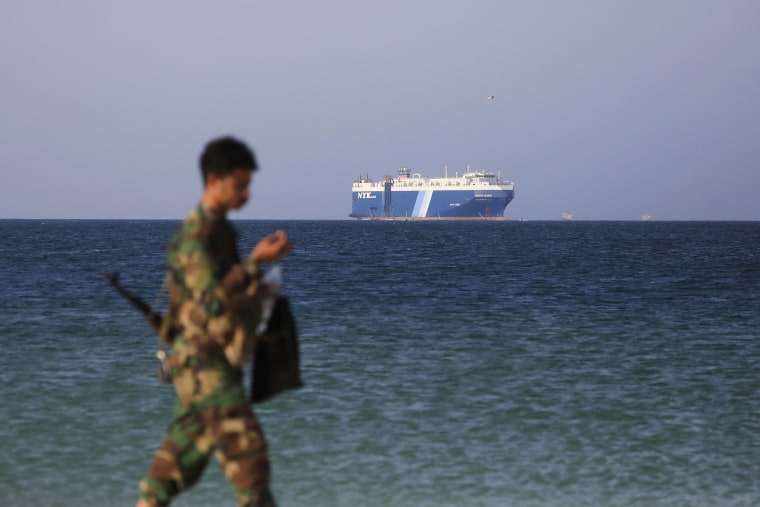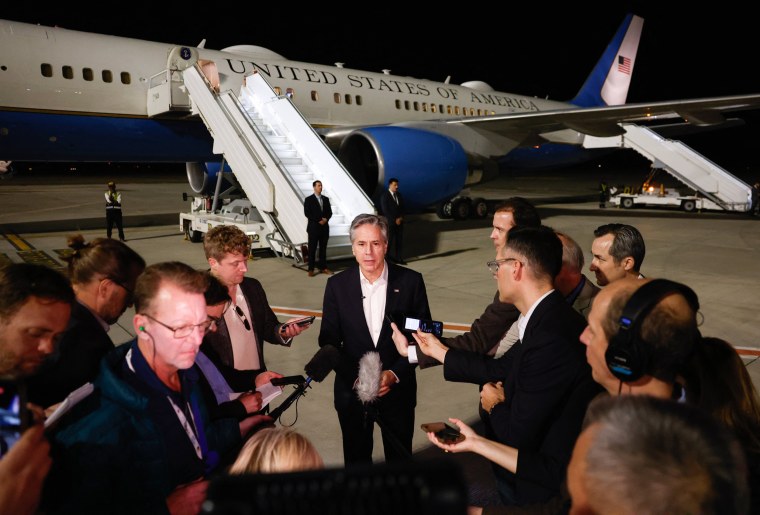DOHA, Qatar — Battle-hardened and backed by Iran, Yemen’s Houthi rebels have launched a series of attacks on Israel as well as commercial ships in the Red Sea, stoking fears of a wider conflict in the region already reeling from the war in Gaza and on tenterhooks about escalating violence between Israel and Hezbollah fighters in Lebanon.
After declaring support for Hamas in its fight against Israel, the Houthis have carried out at least 20 attacks on vessels in the Red Sea since mid-November, ignoring ultimatums by the United States and its Western allies to stop.
In response, the U.S. has struck Houthi vessels in waters near Yemen, and Secretary of State Antony Blinken, during a visit to Saudi Arabia on Tuesday, warned that the Houthis would face “consequences” if the attacks continued. But, he added, the U.S.'s “strong preference is that the Houthis get the message,” rather than face military action.
Strike plans against Houthi bases, boats and weapons have already been drawn up, two diplomats from NATO countries told NBC News earlier this week.
The diplomats, who were not American and not authorized to speak publicly, added that the U.S. was gathering a coalition of up to six countries that could potentially take action, although one of them cautioned that the plans had not been given the green light and may not be.
Their comments came after two administration officials told NBC News last week that members of President Joe Biden’s national security team convened a White House meeting to review possible options, including strikes against Houthi targets in Yemen.
But who are the Houthi militants and how does the group fit into the wider conflict?
‘Partisans of God’
A large clan originating from Yemen’s northwestern Saada province, the Houthis are an extremist movement that follows Zaydism, a branch of Shiite Islam. Yemen was ruled by A Zaydi imamate for 1,000 years, until it was overthrown in 1962. Stripped of their political power since then, the Zaydis struggled to restore their influence in the country.
Formally known as Ansar Allah — or “Partisans of God” — their name comes from Hussein Badr al-Din al-Houthi, their former leader. He led an uprising in 2004 aimed at winning greater autonomy for Yemen’s provinces and protecting them from the perceived encroachment of Sunni Islam, according to the Wilson Center, a Washington-based think tank.

After the Arab Spring protests erupted in several countries in 2011, the group took control of the province of Saada. Three years later, its fighters swept into the capital, Sanaa, and forced President Abed Rabbo Mansour Hadi’s government into exile.
Neighboring Saudi Arabia, unwilling to accept the prospect of Yemen being controlled by a militant organization backed by its regional rival, Iran, responded by starting a war against the group.
But despite support from the U.S., Britain and several other nations, who armed the Saudis with fighter jets and bombs, and provided them with military expertise, the conflict lasted far longer than expected and proved costly for Riyadh.
The war also resulted in what the United Nations calls “the largest humanitarian crisis in the world” — with 80% of Yemen’s 32 million population in need of aid.
With little hope of victory, Saudi Crown Prince Mohammed bin Salman scaled back his military operation and entered peace talks with the Houthis last year.
Throughout the nearly 10-year war, Saudi Arabia had “not been able to stop the Houthi ability to launch missiles,” said Michael Aron, Britain’s former ambassador to Yemen. “I think it would be extraordinary if the Americans were able to take away that capability,” he added.
In their operations against shipping, the Houthis often use fast boats armed with machine guns, but they also boast an arsenal of Iranian-made ballistic and cruise missiles, sea-to-sea missiles and drones, according to the Institute for National Security Studies at Tel Aviv University. Its ballistic missiles have a range of up to 1,200 miles, and its drones can carry a payload of 45 kg. of explosives some 1,500 miles, the institute said.
An American or Israeli strike on Yemen would suit the group’s “propaganda aims,” Aron added, before cautioning, “the danger is the Houthis become more radicalized.”
But he said it was “interesting” that “the Houthis, the Saudis and the Americans are trying to maintain a distance between the peace process and what’s happening in the Red Sea.”
Why is this region so important?
Yemen may be the poorest country in the region, but it forms the eastern side of the Bab al-Mandeb strait — or “the Gate of Grief” — a 16-mile stretch of water that marks the entrance to the Red Sea, one of the most important shipping lanes in the world.
Blinken said Sunday that the Houthis’ attacks had “disrupted or diverted more than 20% of global shipping.” CNBC reported last week that this amounted to some $200 billion in international trade.
Houthi spokesperson Mohammed al-Bukhaiti said Monday that the group was only targeting “ships linked to Israel, and we do not target any ship belonging to other countries,” a claim that has been widely disputed.

He added that the goal was not to sink or seize those ships, but put pressure on Israel to stop its war in Gaza and allow food and medicine into the enclave.
But according to Hakim Almasmari, a veteran political mediator in Yemen, the group wants revenge against the U.S. for supporting Saudi Arabia in its war against them.
Almasmari, who also edits the Yemen Times newspapers, added that the group also believed that their support for Hamas would win support both among their own people and the Arab world, and other places sympathetic to the Palestinian cause.
What is the U.S. doing?
In response to the Houthis lobbing missiles and drones, Washington and its allies have set up Operation Prosperity Guardian, which has seen warships from the U.S., the U.K. and France patrol the Red Sea.
Last week, U.S. helicopters opened fire on Houthi rebels after they attacked a cargo ship, killing several of them. But now there is a question of whether the West might go further after these patrols and retaliatory strikes failed to stop the attacks.
“The United States does not seek conflict with any nation or actor in the Middle East, nor do we want to see the war between Israel and Hamas widen in the region,” White House National Security Council spokesman John Kirby said last week. “But neither will we shrink from the task of defending ourselves, our interests, our partners, or the free flow of international commerce.”
One of the NATO diplomats also said that Yemen was now a “major focus” for Western allies, and “the U.S. might be ready to assemble a group of countries to intervene” and “hit Houthi bases.”
What could go wrong?
Military action will not be an easy fix, said Almasmari, the Yemeni mediator and publisher, who warned the militia could retaliate by targeting “U.S. bases in the Middle East, U.S. ships, vessels and warships.”
“They are basically waiting for the U.S. to attack, they have been wishing for the U.S. to get involved in Yemen for a few years now,” he said.
Some of the U.S.’s allies in the region are also wary of an escalation.
Standing next to Blinken on Sunday, Qatari Prime Minister Mohammed bin Abdulrahman bin Jassim Al Thani said he was aware of events in the Red Sea but called for a diplomatic solution. He added that he was concerned that military action will “keep us in a loop that will never end and will create a real tension in the entire region.”
That’s easier said than done.
The Houthi spokesman, al-Bukhaiti, told NBC News that any further American “aggression” would be met with a “military response” from the group. He also said the Houthis will not stop their attacks unless Washington can convince Israel to stop its “aggression against Gaza.” If that happens, he said, “we will stop our military operations automatically.”
Keir Simmons reported from Doha and Alexander Smith from London.
"conflict" - Google News
January 10, 2024 at 12:53AM
https://ift.tt/JedZ5Rg
Who are Yemen's Houthis launching attacks in the Red Sea? - NBC News
"conflict" - Google News
https://ift.tt/Mni8Ibr
https://ift.tt/i3bf2GN
Bagikan Berita Ini














0 Response to "Who are Yemen's Houthis launching attacks in the Red Sea? - NBC News"
Post a Comment